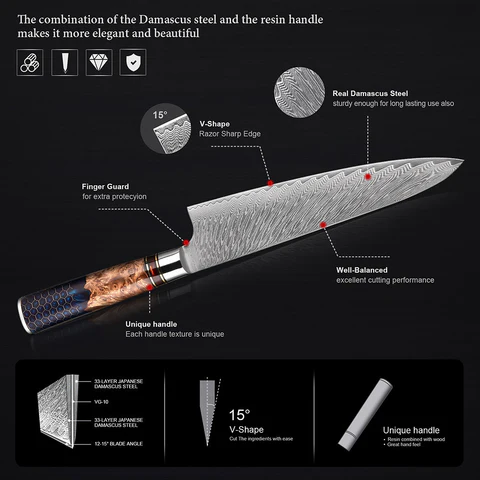"Sharpening your knives isn't just a chore—it's a crucial step toward mastering your kitchen. A sharp blade doesn't just make chopping faster and more efficient; it also enhances your cooking experience by ensuring clean cuts and reducing the risk of accidents. In this article, we'll explore common questions about knife sharpness, offer practical tips for maintaining your knives, and highlight some exceptional options that could revolutionize your culinary skills.

### Why Are Sharp Knives Essential?
There are several compelling reasons why you should invest in keeping your knives sharp:
- **Speed and Efficiency**: A sharp knife requires less effort, allowing you to prep ingredients quickly and efficiently. This is particularly important when you're juggling multiple tasks in the kitchen.
- **Precision**: Clean cuts lead to better presentation and more even cooking. Imagine slicing vegetables or meats with confidence knowing each piece will turn out perfectly uniform.
- **Safety**: Contrary to popular belief, a dull knife is far more hazardous than a sharp one. It tends to slip off surfaces, leading to accidental cuts.
### Testing Knife Sharpness
Before you sharpen, it's essential to know if your knife needs attention. Here are some simple methods to assess its sharpness:
- **The Paper Test**: Hold a sheet of paper vertically and attempt to slice through it with the knife. If the blade glides smoothly without tearing the paper, it's sharp.
- **The Tomato Test**: A ripe tomato is a great indicator. If your knife can slice through the skin cleanly without mashing the fruit underneath, it’s sharp enough.
- **The Hair Test**: For those feeling adventurous, lightly run the blade across the grain of your arm hair. If it slices through easily, your knife is razor-sharp.
### Maintaining Your Blade
Knowing how often to sharpen your knives depends on usage. Professional chefs may sharpen daily, while occasional users might only need to do so monthly. However, frequent honing with a steel rod can preserve sharpness between proper sharpenings.
When it comes to sharpening techniques, there are a few methods to consider:
- **Whetstone**: This traditional method provides excellent results but requires practice. Coarse stones set the edge, while finer ones polish it.
- **Electric Sharpener**: Convenient and quick, though it may remove more metal than necessary.
- **Honing Rod**: Used to realign the blade's edge rather than sharpening it. Regular honing ensures the blade stays sharp longer.
### Storing Your Knives Properly
Proper storage extends the life of your knives:
- **Knife Block**: Keeps knives organized and protected from damage. It’s a practical solution for home kitchens.
- **Magnetic Strip**: Offers easy access and visibility, making it ideal for professional kitchens.
- **Sheaths**: Perfect for storing knives in drawers, protecting them from dust and accidental bumps.
### Elevating Your Culinary Experience
High-quality knives are game-changers in the kitchen. Here are some standout options:
- **SAKUTO Japanese Damascus Steel Kitchen Knife Set with Blue Handle**: Combining beauty and functionality, this set features a Damascus steel blade for durability and a comfortable blue handle. Ideal for both beginners and seasoned chefs.
- **Okugai Damascus Steel Kitchen Knife with Abalone Handle**: This modern yet classic knife ensures precise cuts. Its abalone handle adds a touch of elegance, making it perfect for sushi chefs.
- **SAKUTO Japanese Damascus Steel Kitchen Knife with Colored Octagonal Handle**: With its vibrant colors and ergonomic design, this knife is not just functional but also visually appealing. Its sharp blade handles all cooking tasks seamlessly.
### Frequently Asked Questions
- **Can I Sharpen Knives at Home?**
Absolutely, with the right tools and knowledge, you can achieve professional results using a whetstone or electric sharpener.
- **How Do I Know If My Knife Is Dull?**
If your knife struggles to cut through soft foods or requires excessive force, it's likely dull. The paper or tomato test can confirm.
- **What’s the Difference Between Honing and Sharpening?**
Honing realigns the blade's edge, while sharpening removes material to create new edges.
- **Are Dull Knives Dangerous?**
Yes, they increase the likelihood of accidents due to slipping and require more force, raising the risk of injury.
- **How Do Professional Chefs Maintain Their Knives?**
Most chefs hone their knives regularly and occasionally sharpen them using professional services or personal sharpening tools.
### Conclusion
Having sharp knives isn’t just about convenience—it’s about enhancing your entire cooking experience. By understanding the importance of sharpness and following proper maintenance practices, you’ll not only protect yourself but also elevate your culinary skills. Investing in quality knives, like those from SAKUTO or Okugai, can make a world of difference. Whether you’re a beginner or a seasoned chef, prioritizing knife care is essential. After all, a sharp knife is the foundation of great cooking."
Lead Glasses X-Ray Radiation Eye Protection,Radiation Protective Eyewear,Lead Glasses Interventional Radiology,Anti Radiation Glasses
Longkou Kangxie Medical Instrument Co., Ltd , https://www.kangxiemedical.com